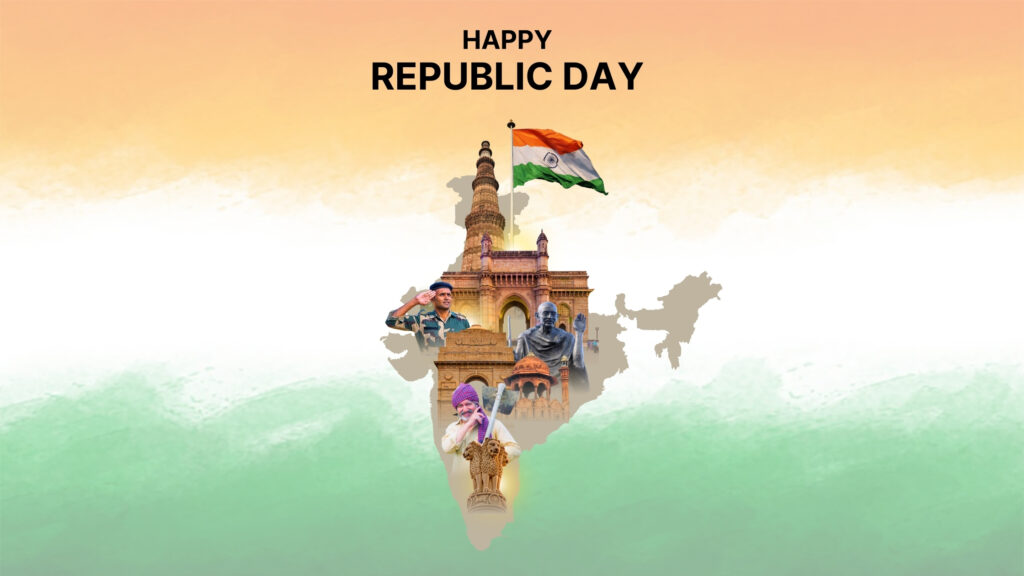Republic Day, celebrated every year on January 26, is one of the most significant national holidays in India. It marks the day when India officially adopted its Constitution, becoming a sovereign republic. As we step into 2025, Republic Day continues to be a symbol of national pride, unity, and the triumph of democracy. But why do we celebrate Republic Day in India? What does it represent, and how has its significance evolved over the years? In this blog, we will explore these questions in detail, shedding light on the rich history and enduring relevance of this special day.
1. Historical Background of Republic Day
The origins of Republic Day can be traced back to the Indian independence movement. After India gained independence from British rule on August 15, 1947, the country did not immediately have its own Constitution. Instead, it functioned under laws dictated by the British colonial government.
It was during this period of transition that the need for a sovereign Constitution was felt strongly by India’s leaders. The Constituent Assembly, which was tasked with drafting the Constitution, took several years to complete the process. Finally, on November 26, 1949, the Constitution of India was adopted. However, it did not come into effect immediately. It was set to take effect on January 26, 1950.
Why January 26? This date had already gained significant importance in India’s struggle for independence. On January 26, 1930, the Indian National Congress, led by Jawaharlal Nehru, had declared Purna Swaraj (Complete Independence) as the goal for India, rejecting British rule. By choosing this date, India paid homage to the freedom struggle and symbolically completed its journey from being a colony to a republic.
Thus, on January 26, 1950, India officially became a republic, with the Constitution coming into force. From that day onwards, January 26 is celebrated annually as Republic Day.
2. The Constitution of India
To fully appreciate why we celebrate Republic Day, it is crucial to understand the importance of the Indian Constitution. The Constitution is the supreme law of the land and outlines the framework for the political principles, structure, and duties of the government, as well as the fundamental rights of citizens.
Dr. B.R. Ambedkar, who is regarded as the chief architect of the Constitution, played a pivotal role in drafting this landmark document. The Constitution was designed to ensure that India would be a democratic nation where all citizens have equal rights, regardless of their background, religion, or social status.
Republic Day marks the day when India transitioned from being a Dominion under the British Crown to becoming a fully independent republic, governed by its own set of laws and values enshrined in the Constitution. The Constitution gave birth to a democratic India, and Republic Day serves as a reminder of the nation’s commitment to justice, liberty, equality, and fraternity.
3. National Pride and Patriotism
Republic Day is not just about history—it’s a day of immense national pride. It serves as a reminder of India’s long struggle for independence and the values that the nation stands for. The sacrifices made by freedom fighters, who fought against British colonial rule, are commemorated on this day. Leaders like Mahatma Gandhi, Jawaharlal Nehru, Subhas Chandra Bose, and many others dedicated their lives to the cause of India’s freedom.
On Republic Day, Indians across the country take pride in the progress their nation has made since independence. From being a poor, war-ravaged nation, India has emerged as one of the world’s largest economies and a global leader in science, technology, and culture. Republic Day celebrations offer a moment for every citizen to reflect on how far the country has come, while also recognizing the challenges it still faces.
The sense of unity that Republic Day fosters is palpable. Regardless of regional, linguistic, or religious differences, people across India come together to celebrate the nation’s achievements. Republic Day is a day when every citizen, young or old, urban or rural, is reminded of their role in building the India of tomorrow.
4. Republic Day Celebrations
One of the most significant aspects of Republic Day is the grand celebrations that take place, particularly in the capital city of New Delhi. The Republic Day Parade is a spectacular display of India’s cultural diversity, military might, and achievements. The parade is held at Rajpath, with the President of India presiding over the event.
The parade begins with a display of India’s military strength, with armed forces marching in precise formations, showcasing tanks, missiles, and other advanced weaponry. This is followed by cultural performances from various states, reflecting the rich diversity of India’s traditions, dances, and music.
One of the highlights of the parade is the presentation of the national awards. The President of India bestows the Padma Awards, which recognize individuals for their exceptional contributions to various fields, including arts, science, literature, and public service. Republic Day is a day when India celebrates its heroes and heroines—those who have contributed to the nation’s progress and welfare.
In addition to the national celebrations, Republic Day is marked by events in every state and city across India. Schools, colleges, government offices, and communities organize flag-hoisting ceremonies, parades, and cultural programs to commemorate the day. Republic Day celebrations are also an opportunity for people to reaffirm their loyalty to the nation and its democratic values.
5. Honoring the Heroes
Republic Day is also a time to honor the men and women who have dedicated their lives to the service of the nation. The day is marked by the presentation of various awards, such as the Ashoka Chakra, Kirti Chakra, and other bravery awards. These awards recognize the extraordinary courage and sacrifice of soldiers and civilians who have worked to protect the country’s sovereignty.
In addition, Republic Day is a day to honor the freedom fighters who played a crucial role in the independence struggle. It is a reminder of the resilience, determination, and sacrifices that went into securing the nation’s freedom. Their legacy lives on in the democratic system that India enjoys today.
6. The Role of Education and Youth
Republic Day also holds special significance for India’s youth. Schools and educational institutions actively participate in the celebrations, with students performing dances, dramas, and patriotic songs. Flag hoisting ceremonies in schools and colleges are an integral part of the celebrations, reinforcing the importance of national pride and unity.
Republic Day celebrations provide a platform for the younger generation to learn about India’s history, its Constitution, and the importance of upholding democratic values. It reminds them of the rights and responsibilities they have as citizens of a republic. By actively participating in the celebrations, students are instilled with a sense of duty and national pride, ensuring that the values of Republic Day are passed down to future generations.
7. Current Relevance: Why Celebrate in 2025?
As we approach Republic Day 2025, it is essential to recognize that the relevance of this day has not diminished over the decades. India continues to face challenges such as economic inequality, political tension, and environmental concerns. Republic Day serves as a reminder that the journey of democracy is ongoing and requires the active participation of all citizens.
In 2025, Republic Day remains an occasion to celebrate India’s progress and acknowledge its potential. It is a time to reflect on the nation’s achievements, its democratic spirit, and the work still to be done to ensure that every Indian citizen enjoys the rights and freedoms enshrined in the Constitution.
FAQs
1. What is the significance of Republic Day in India?
Republic Day marks the day when India officially became a republic on January 26, 1950, with the adoption of the Constitution of India. It symbolizes India’s transition from being a British colony to a sovereign democratic republic.
2. Why is Republic Day celebrated on January 26?
January 26 was chosen because it was on this day in 1930 that the Indian National Congress declared Purna Swaraj (complete independence) as the goal for India. The day was symbolic of India’s commitment to self-rule, and it became the date when the Indian Constitution came into force in 1950.
3. Who was the architect of the Indian Constitution?
Dr. B.R. Ambedkar is known as the principal architect of the Indian Constitution. His vision for a just and democratic India is reflected in the document, which ensures equality and justice for all citizens.
4. What are the key events of Republic Day celebrations in India?
The main event is the Republic Day Parade held in New Delhi, which showcases India’s military might, cultural diversity, and achievements. The President of India presents national awards like the Padma Awards, and there are various state-level celebrations as well.
5. Why is Republic Day important for the youth of India?
Republic Day is an opportunity for the youth to learn about India’s history, the Constitution, and the importance of democracy. Schools and colleges actively participate in the celebrations, instilling a sense of pride and duty among young Indians.
Conclusion
Republic Day is more than just a public holiday—it is a day of immense national significance. It is a time to reflect on India’s progress as a democratic republic, honor the sacrifices of freedom fighters, and celebrate the values that make India a unique and vibrant nation. As we commemorate Republic Day in 2025, we continue to reaffirm our commitment to the ideals of justice, equality, and fraternity, which form the bedrock of the Indian Republic.
If you enjoyed this blog, don’t miss out on our previous one How IAS Srishti Dabas Cracked UPSC Exam While Working at RBI




